by Lisa Cooke | Apr 22, 2016 | 01 What's New, Records & databases
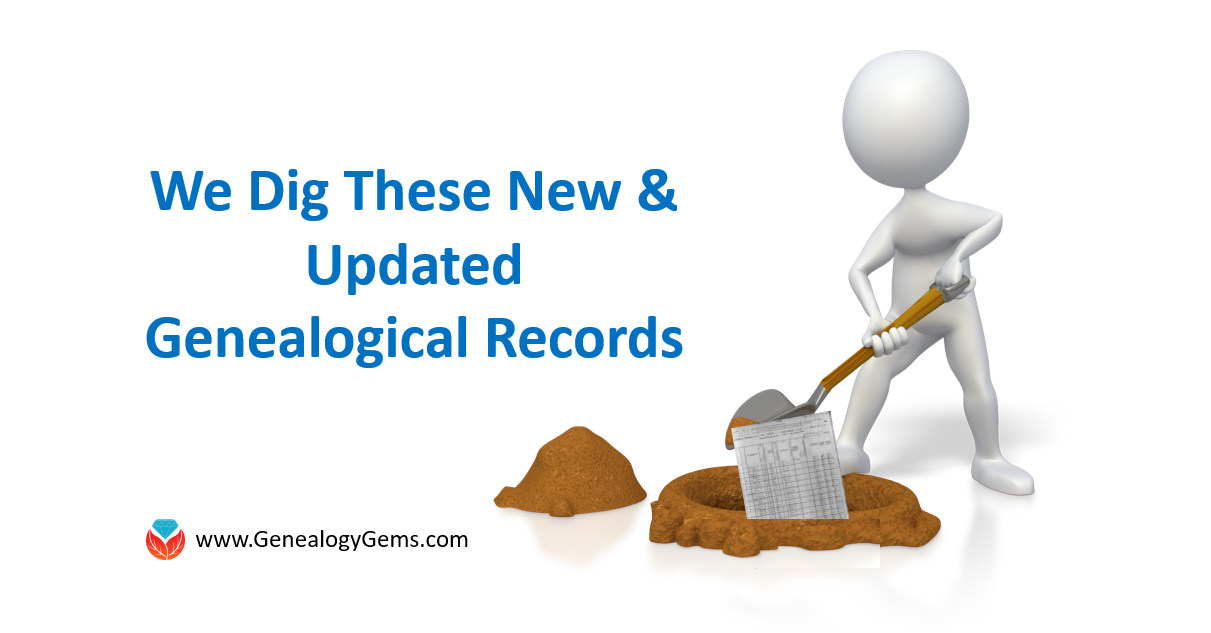 Here’s our weekly roundup of new genealogy records online. This week: Great Britain, Ireland, Sweden, the U.S. and Australia.
Here’s our weekly roundup of new genealogy records online. This week: Great Britain, Ireland, Sweden, the U.S. and Australia.
AUSTRALIA LAND. Land grant deeds for Tasmania, Australia (1804-1935) are now searchable on Ancestry.com. The format and content varies: sometimes you’ll find the name, location, description, date, payment amount and witnesses. These records come from the Tasmanian Archive and Heritage Office.
AUSTRALIA NEWSPAPERS. Over 700 newspapers digitized by the National Library of Australia (NLA) are now searchable at MyHeritage.com. This collection is also searchable at Trove, the digital newspaper library for the NLA. The benefit to having this collection at MyHeritage.com is that the site uses its Record Match technology to automatically search the newspapers for individuals on your tree, matching on several parameters to improve search results.
AUSTRALIA WWII. A new index to Australia World War II military service records (1939-1945) is available on Ancestry.com. It covers the Australian Army, Royal Australian Navy and Royal Australian Air Force. Records “commonly contain biographical information supplied on enlistment, as well as important details on a person’s service.” See info on ordering the original records from the National Archives of Australia in the Ancestry.com collection description.
GREAT BRITAIN – DIRECTORIES, ALMANACS. Ninety new volumes of directories and atlases (late 1800s and early 1900s) have been added to Findmypast’s online collection, “Great Britain, Directories & Almanacs.” According to the collection description, “Inside you will find the names of prominent people, tradesmen, people who held office, business owners and local civil servants. Discover your ancestor’s address and occupation or explore the history of your home address. The almanacs and directories stretch across three centuries.”
IRELAND – HISTORICAL. A new historical collection relating to the Easter Island uprising is available on Findmypast.com. This collection is free to search until April 27, 2016. According to a company rep, the database draws on “75,000 records that tell the story of one of the most difficult periods in 20th century Irish history. These records, once classified, include eye witness accounts, interviews with civilians and reports of the trials of the leaders of the Rising and their sentences of execution. The release also includes 25,000 search and raid records, giving detailed insights into how the Irish people of the period lived under martial law.”
SWEDEN EMIGRATION. Ancestry.com has posted a new database with over 1.3 million entries of emigrants listed in church books, 1783-1991. That represents about 75% of emigrants, of people leaving the country, during that time span. The records and index are in Swedish. This database was previously available in CD format under the name “Emibas.”
U.S. WILLS. Ancestry.com’s enormous collection of U.S. wills and probate records has been updated for the following states: Ohio, Alabama, New York, New Jersey, Arkansas and Georgia.
 Thank you for sharing this list with every genealogist you know who might be interested! We love sharing good news about new genealogy records online.
Thank you for sharing this list with every genealogist you know who might be interested! We love sharing good news about new genealogy records online.
by Lisa Cooke | Jun 24, 2017 | 01 What's New, Jewish, Newspaper, Volunteer
Looking for an easy way to make a big difference? Help collect Holocaust newspaper articles printed in your local newspapers for the History Unfolded project of the United States Holocaust Memorial Museum. Do it on your own, or with your local genealogical or historical society!
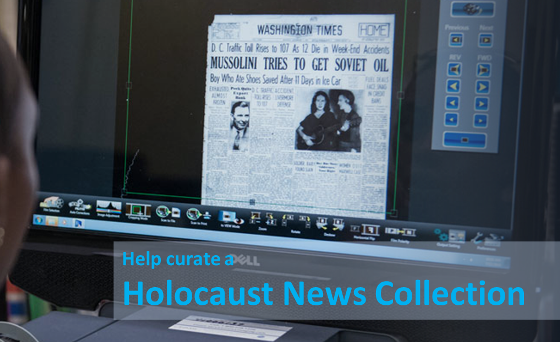
The following article came to us via Newspapers.com:
What is History Unfolded? History Unfolded is a project that seeks to expand our knowledge of how American newspapers reported on Nazi persecution during the 1930s and ’40s so we can better understand what Americans knew about the Holocaust as it was happening.
To help achieve this, the History Unfolded project asks people like you to search local newspapers from the 1930s and ’40s for Holocaust-related news and opinions and then submit them online to the museum. The newspaper articles you submit will be used to help shape the museum’s 2018 exhibit on Americans and the Holocaust and related educational materials. The articles will also be made available to scholars, historians, and the public.
Who Can Contribute? Everyone! History buffs, students, teachers (with) an interest in the Holocaust and access to a newspaper from the 1930s or ’40s, either online (using Newspapers.com, for example) or through a physical archive, such as a library. Simply create an account with History Unfolded (to get started.)
How Do I Contribute? History Unfolded has created a list of more than 30 Holocaust-related events to focus on. Choose one of these events to research, then search for content related to that topic in an American newspaper of your choice from the 1930s or ’40s. After you find an article related to one of the events, submit it online to the museum through the project’s website.
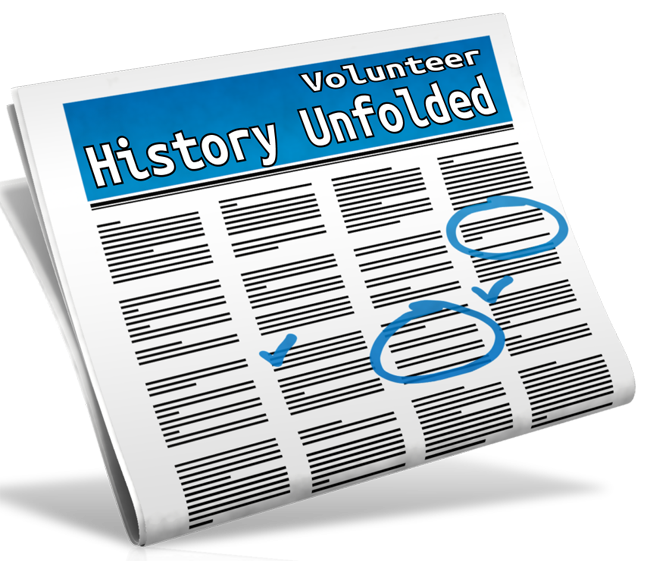 Newspapers.com and History Unfolded You can contribute to this important project whether or not you use Newspapers.com to do so. But using Newspapers.com makes it even easier to submit the articles you find. Simply use Newspapers.com to create a clipping of an article you’ve found, then submit that clipping through the submission form on the History Unfolded website. The submission form has a special tool created specifically for Newspapers.com users that makes submitting your clipping a snap.
Newspapers.com and History Unfolded You can contribute to this important project whether or not you use Newspapers.com to do so. But using Newspapers.com makes it even easier to submit the articles you find. Simply use Newspapers.com to create a clipping of an article you’ve found, then submit that clipping through the submission form on the History Unfolded website. The submission form has a special tool created specifically for Newspapers.com users that makes submitting your clipping a snap.
Your help with this project will help shape our understanding of the Holocaust and the lessons it holds for us today. For more information on how to get involved, visit the History Unfolded website.
Get involved! Click here to read about more ways to volunteer in our global genealogy community. Your efforts make a huge difference.
by Lisa Cooke | Oct 21, 2016 | 01 What's New, Records & databases
Scottish genealogy records are as popular as plaid this fall. Deeds, paternity records, and censuses are just a sampling. Also this week, records for Ontario, New York State, Philadelphia, and the women’s suffrage movement!
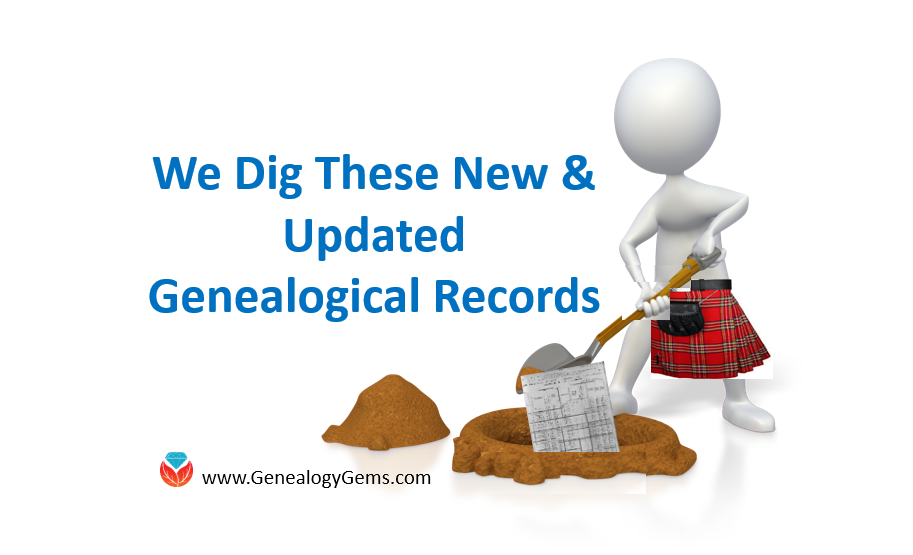
Scotland – Deeds
Findmypast offers Scotland Deeds Index 1769 with over 1,000 transcripts. This collection contains the details found in minute books kept by the Court of Session and includes a variety of different types of deeds including: assignations, discharges, bonds, obligations, protests, and leases. Each deed transcript will record the type of deed, the date it was recorded, and the two parties named in the original court document, their addresses, and occupations.
By understanding what each type of deed is, you may be able to glean additional clues to your research. For example, a discharge is granted once evidence is shown to a granter that a debt or payment has been paid in full. Discharges were also given to release an individual from specific tasks or duties. A heritable bond, however, is in regard to land, property, or houses that pass to an heir or next of kin. In some of these cases, the records could be proof of parentage. For more details about the types of deeds in this collection, read here.
Scotland – Paternity Decrees
Containing over 25,000 records, Scotland, Paternity Decrees 1750-1922 will help you find out if your ancestor was involved in a paternity dispute that appeared before Scotland’s Sheriff Court. These records could identify illegitimate ancestors and break down brick walls in your research. You will find cases from jurisdictions across Scotland including: Kirkcudbrightshire, Lanarkshire, Midlothian, and Roxburghshire.
Each record offers a date of birth and sex of the child whose paternity is in question as well as the name, occupation, and residence of both the pursuer and defender.
Scotland – Census and Population List
Also at Findmypast, Scotland Pre-1841 Censuses and Population Lists now contains over 3,500 early census fragments and parish lists from Jedburgh, Greenlaw, Ladykirk, Melrose, Applegarth, and Sibbaldbie. Until 1845, these courts were for governing the local parish and overseeing parish relief. Many kept up-to-date lists of the parish residents, their occupations, and their birth places.
The details recorded in each transcript will vary, but most will include a birth place, occupation, and address.
Scotland – Registers & Records
Over 1,700 new records have been added to the collection titled Scotland Registers & Records at Findmypast. These additions include Written Histories of the Highland Clans & Highland Regiments.
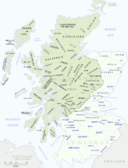
By Gsl [Public domain], via Wikimedia Commons
Scotland Registers & Records contain images taken from 21 different publications related to Scottish parishes and families. The records vary and include parish records, topographical accounts, and memorial inscriptions.
Some of these records reach back as far as the year 1100! To see a list of each of the publications within this collection, click here, then scroll down to the subheading, “What can these records tell me?”
Canada – Ontario – Birth Index
Findmypast offers a collection titled Ontario Birth Index 1860-1920. It is comprised of 1.7 million civil registration records. Civil registration in Canada is the responsibility of the individual provinces and territories and it was not standard practice until the late 1800s.
Each record contains both a transcript and an image of the original document. Information should include:
- Ancestor’s name and date of birth
- Place of birth
- Parents’ names
In some cases, the record may also provide:
- Parents’ occupations
- Where the parents were married
- Name of the attending physician
- Address of residence
Special Savings for You

If you are interested in subscribing to Findmypast, we want to let you know about a special savings. Findmypast is now offering a year subscription for $34.95, a savings of $79.95. Click here for more details!
United States – New York – City Directories
New York Public Library is digitiz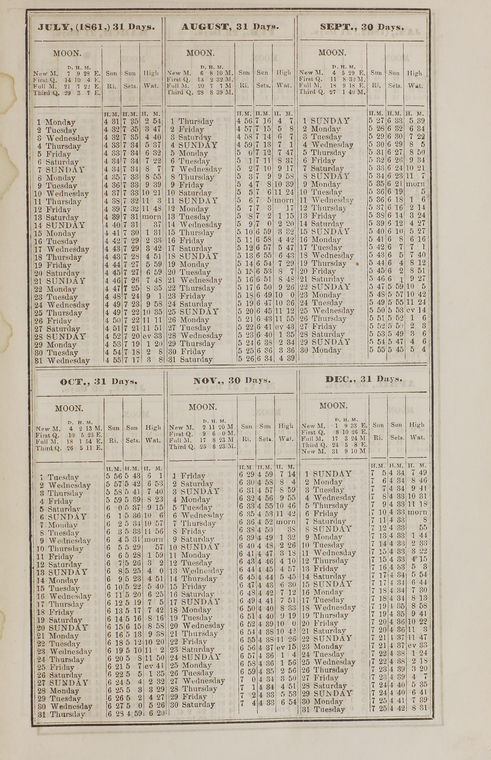 ing its collection of New York City Directories, 1786 through 1922/3, and sharing them for free through the NYPL Digital Collections portal.
ing its collection of New York City Directories, 1786 through 1922/3, and sharing them for free through the NYPL Digital Collections portal.
The first batch—1849/50 through 1923—have already been scanned and the 1786–1849 directories are in the process of being scanned. The whole collection will be going online over the coming months.
See the digitized directories here.
City directories contain more than just names and addresses. You may be surprised to learn that they record the price of travel and postage, the kinds of occupations around the city, the layout of streets, and at what time the sun was predicted to rise and set!
City directories might also contain images, maps, illustrations of buildings, and advertisements.
United States – Massachusetts – Women’s Suffrage
The Massachusetts Historical Society has announced that seven collections relating to women in the public sphere have been digitized. A grant made it possible to create high resolution images that are accessible at the MHS website, as well as preservation microfilm created from the digital files. The seven collection titles and links are listed below.
Juvenile Anti-Slavery Society records, 1837-1838
http://www.masshist.org/collection-guides/view/fa0427
Massachusetts Association Opposed to the Further Extension of Suffrage to Women, 1895-1920
http://www.masshist.org/collection-guides/view/fa0121
New England Freedmen’s Aid Society records, 1862-1878
http://www.masshist.org/collection-guides/view/fa0423
Rose Dabney Forbes papers, 1902-1932
http://www.masshist.org/collection-guides/view/fa0212
Society for the Employment of the Female Poor trustees’ reports, 1827-1834
http://www.masshist.org/collection-guides/view/fa0428
Twentieth Century Medical Club records, 1897-1911
http://www.masshist.org/collection-guides/view/fa0411
Woman’s Education Association (Boston, Mass.) records, 1871-1935
http://www.masshist.org/collection-guides/view/fa0393
United States – Pennsylvania – Newspapers
Check out the Philadelphia Inquirer on Newspapers.com. The Philadelphia Inquirer is one of the oldest surviving papers in the United States. The Philadelphia Inquirer was established in 1829 and originally titled the Pennsylvania Inquirer. It was originally a Democratic paper that supported President Jackson.
This collection covers the years of 1860-2016.
If you’re looking for specific mentions of an ancestor, you might find them in lists of death notices, marriage licenses, local social news, the day’s fire record, or building permits issued. This newspaper is searchable by keyword or date.
United States – Nebraska – Marriages
New this week at FamilySearch are the Nebraska, Box Butte County Marriages, 1887-2015. Information found in these marriage records does vary, but you may find any of the following:
- Name
- Age
- Estimated birth year
- Birth city/town, county, state, and country
- Marital status
- Marriage date
- Marriage city/town, county, and state
- Parents’ names
- Previous spouse
More Helpful Tips for Scottish Genealogy
Lisa’s Premium Member episode 116 is  just what you need. Marie Dougan, a professional genealogist specializing in Scottish research, joins Lisa in this episode to talk about how to research Scottish ancestors. If you haven’t taken that plunge and become a Premium Member, why not do so today! There are over 100 Premium Member podcast episodes and over 30 video classes on a wide variety of genealogy topics waiting to inspire and educate. Join today!
just what you need. Marie Dougan, a professional genealogist specializing in Scottish research, joins Lisa in this episode to talk about how to research Scottish ancestors. If you haven’t taken that plunge and become a Premium Member, why not do so today! There are over 100 Premium Member podcast episodes and over 30 video classes on a wide variety of genealogy topics waiting to inspire and educate. Join today!
 Here’s our weekly roundup of new genealogy records online. This week: Great Britain, Ireland, Sweden, the U.S. and Australia.
Here’s our weekly roundup of new genealogy records online. This week: Great Britain, Ireland, Sweden, the U.S. and Australia. Thank you for sharing this list with every genealogist you know who might be interested! We love sharing good news about new genealogy records online.
Thank you for sharing this list with every genealogist you know who might be interested! We love sharing good news about new genealogy records online.

 Newspapers.com and History Unfolded You can contribute to this important project whether or not you use Newspapers.com to do so. But using Newspapers.com makes it even easier to submit the articles you find. Simply use Newspapers.com to create a clipping of an article you’ve found, then submit that clipping through the
Newspapers.com and History Unfolded You can contribute to this important project whether or not you use Newspapers.com to do so. But using Newspapers.com makes it even easier to submit the articles you find. Simply use Newspapers.com to create a clipping of an article you’ve found, then submit that clipping through the 


 ing its collection of
ing its collection of 